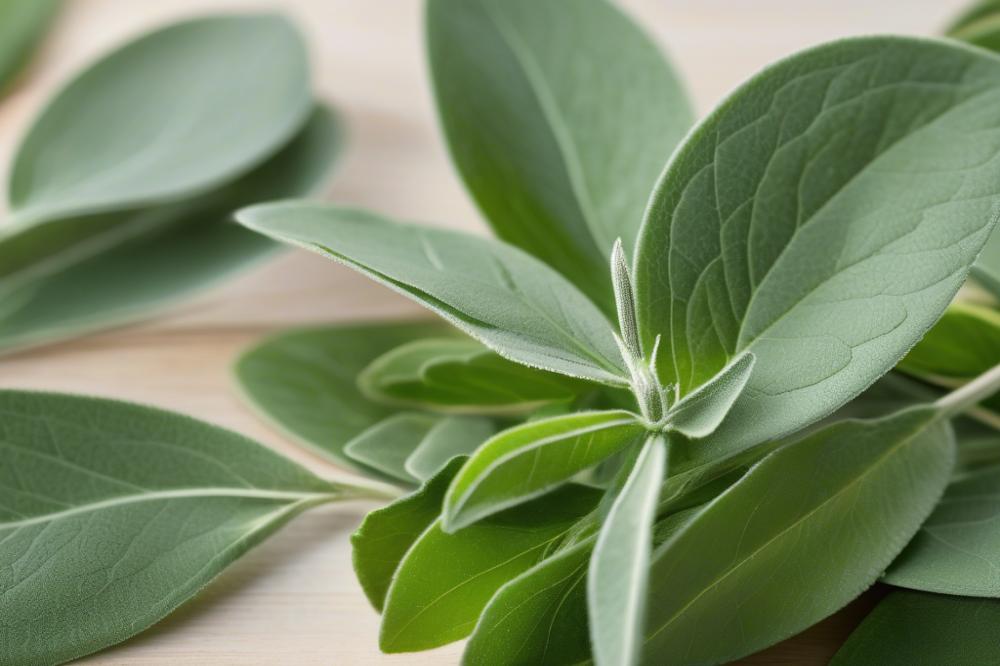sage: A Herb for cognitive health and menopause relief
Throughout history, Medicinal plants have played a significant role in promoting well-being. People have turned to nature for healing and support for centuries. These natural remedies often provide alternatives to synthetic medications. Among these remarkable plants, sage stands out as a key herb with diverse health benefits. Its usage can be traced back to ancient civilizations, where it was valued not only for its flavor but also for its medicinal properties.
This delightful herb is well-known for its unique ability to aid in memory enhancement. Many have found it effective in improving brain function and reducing the risk of cognitive decline. As more individuals seek out natural supplements, sage emerges as a prominent option. Its antioxidant properties and calming effects make it a popular choice for those looking to boost their overall mental capacity.
Additionally, hormonal changes during menopause often bring about a range of challenging symptoms. Many women experience mood swings, anxiety, and other uncomfortable feelings during this transition. Sage offers promising menopause relief by potentially aiding in hormonal balance. Moreover, it may help alleviate daily stressors through its calming effects. This combination of benefits makes sage a powerful herb for women navigating this significant life change.
The significance of sage as an herbal remedy cannot be overstated. Its rich history in traditional medicine highlights its effectiveness and versatility. Many seek out sage not only for its culinary uses but also for overall health support. Those looking to improve their quality of life can benefit greatly from incorporating this remarkable herb.
Sage: An Overview


Sage, a prominent herb in the culinary world, offers more than just flavor. This plant, belonging to the mint family, boasts silvery-green leaves that release a strong, earthy aroma. Beyond its culinary uses, sage has become recognized as an herbal remedy with various health benefits. It has garnered attention for its potential role in supporting memory enhancement and easing menopause symptoms.
Historically, sage has deep roots in traditional medicine. Ancient cultures often turned to this herb for its numerous therapeutic properties. In the Mediterranean, it was used to promote good health. Furthermore, medieval herbalists valued it for its ability to treat ailments ranging from digestive problems to respiratory issues. Across generations, sage has maintained its role as a healing agent, echoing its significance in old herbal texts.
Types of Sage and Their Unique Properties
Several varieties of sage exist, each with its characteristics. Common garden sage, or Salvia officinalis, is perhaps the most well-known and widely used. This variety is renowned for its antioxidant properties, contributing to overall health. Another type, Moroccan sage, has a slightly different flavor profile and is frequently used in culinary dishes across North Africa.
Pineapple sage, a type that has gained popularity, is not only decorative but also offers a pleasant fruity scent. It can serve as a refreshing tea, providing potential anxiety relief. Additionally, there are many other species of sage that can be found worldwide, each with distinct qualities. Some variants are believed to support hormonal balance, making them especially beneficial for women experiencing menstrual or menopausal discomfort.
The multifaceted uses of sage make it an appealing option for those seeking natural supplements. Those searching for answers to cognitive health issues or ways to relieve menopause symptoms might find solace in sage’s properties. As part of a holistic approach to wellness, incorporating this herb could promote a well-rounded lifestyle.
Cognitive Health Benefits of Sage


Sage has long been recognized in traditional medicine for its numerous health benefits. This herb plays a significant role in enhancing brain function. Its unique compounds can support various aspects of cognitive health.
Memory enhancement is one of the most notable benefits associated with sage. Users often report improved recall and sharper thinking after consuming this herbal remedy. Even in individuals experiencing menopause symptoms, sage appears to offer positive effects on cognitive capabilities.
Research studies have illustrated a clear link between sage and cognitive performance. These studies suggest that compounds in sage may help protect brain cells from damage. Participants in some studies showed improved performance on memory tests after taking sage as a natural supplement.
Antioxidant properties of sage are an essential factor contributing to brain health. Antioxidants help reduce oxidative stress, which can harm brain cells. By combating free radicals, this herb supports overall brain vitality.
For women facing hormonal imbalance, sage might provide valuable anxiety relief along with its cognitive benefits. This makes it a popular choice in herbal remedies for managing menopause symptoms. The dual action of supporting cognitive health while also addressing emotional well-being can be quite beneficial.
Sage and Menopause Symptoms


Menopause signals a significant change in a woman’s life. It usually occurs in middle age and brings about various symptoms that many find challenging. Common issues during this phase include hot flashes, night sweats, mood swings, and memory disturbances. These changes can be uncomfortable and sometimes overwhelming.
Sage has been recognized as an effective herbal remedy for promoting hormonal balance. This remarkable plant has been used in traditional medicine for centuries. It contains compounds that may influence estrogen levels, which can help ease certain menopause symptoms. Many women seek natural supplements like sage when dealing with these life transitions.
Research shows that sage may effectively alleviate hot flashes and night sweats. In one study, women who took sage extract reported a noticeable reduction in the frequency of these episodes. The results suggest that sage acts on the body in a way that helps manage temperature control during moments of distress caused by hormonal fluctuations.
Another significant aspect of using sage during menopause is its ability to provide anxiety relief. Many women experience increased stress and anxiety due to the hormonal shifts they go through. Sage may offer some comfort. Its antioxidant properties contribute to a calming effect, which can be invaluable during stressful periods. This herb not only promotes overall well-being but also supports emotional health during a time of change.
Natural Supplements and Sage


Sage is more than just a culinary herb; it serves as a popular herbal remedy for various health issues. Several forms of sage supplements are available in the market. You can find it in capsules, extracts, or dried leaves. Each form has certain advantages based on how you prefer to take it. For example, capsules offer convenience, while extracts might provide a more concentrated dose.
When it comes to recommended dosages, many experts suggest taking about 300 to 600 mg of sage extract daily. However, the exact amount can vary depending on the specific product and individual needs. Always read the labels carefully. Those considering dried sage leaves often brew them into a tea. Steeping a teaspoon of dried leaves for about 10 minutes can create a soothing infusion. This method also allows you to enjoy the antioxidant properties that sage offers.
Comparing Sage with Other Natural Supplements
Sage may stand out when comparing it to other natural supplements aimed at enhancing memory and relieving menopause symptoms. For instance, ginkgo biloba is popular for cognitive support, while ashwagandha is often chosen for anxiety relief. Both of these supplements have their own benefits, but sage has specific advantages in promoting hormonal balance during menopause. Traditional medicine has long recognized the effects of sage on overall well-being.
While ginkgo biloba focuses on blood flow to the brain, sage offers a wider array of health benefits, including its ability to ease anxiety and support hormonal changes in women. Other alternative remedies may address specific symptoms, but sage provides a holistic approach due to its combination of properties. Whether you’re seeking memory enhancement or help managing menopause symptoms, sage can be worth considering.
Integrating Sage into Your Routine
Tips on Incorporating Sage into Daily Life
Sage is not just a cooking herb; it is an herbal remedy with many health benefits. You can start by adding fresh sage leaves to your meals. Sprinkle them onto roasted vegetables or mix into pasta dishes. Try using dried sage in soups or stews for added flavor and nutrition. Another simple way to enjoy sage is by brewing it into a tea. This practice has roots in traditional medicine and offers a comforting ritual for anyone seeking relaxation.
Sage Recipes and Infusion Methods
Consider making a refreshing sage infusion by steeping a few leaves in hot water. Allow it to sit for about 10 minutes and then enjoy. This drink can provide anxiety relief and might ease some menopause symptoms. If you prefer, blend sage leaves into a smoothie alongside fruits and yogurt. This creates a unique and nutritious treat while offering memory enhancement benefits. Try experimenting with sage in sauces or marinades as well. Its flavor pairs nicely with poultry and fish, making meals even more delightful.
Overall Lifestyle Changes that Support Hormonal Balance
Adopting a balanced diet is crucial for anyone focusing on wellness. Incorporating a variety of fruits, vegetables, and whole grains can help maintain health. Exercise regularly to keep your body active and support hormonal balance. Mindfulness and stress-reduction techniques like yoga or meditation can also make a difference. Choose natural supplements and herbs, like sage, to enhance your daily routine further. Committing to these changes can amplify the benefits of this remarkable herb and lead to improved well-being in everyday life.
Final Thoughts on Sage for Health and Well-being
Recapping the benefits of sage reveals its remarkable potential. This herb not only supports brain health but also offers relief during menopause. Many women have found comfort through its natural properties. With age, cognitive functions can decline, and this herb may help mitigate those effects. Its ability to balance hormones is especially important during menopausal transitions.
Considering sage as an herbal remedy is an excellent choice for those seeking natural solutions. It combines tradition with emerging science, creating a blend of wisdom and innovation. Adding sage to your daily routine might be a simple yet effective step toward overall well-being. Herbal solutions like this can offer an alternative to synthetic treatments, appealing to those who prefer more natural options.
Future research will likely explore even more extensive health benefits linked to sage. Studies may reveal further insights into its effects on the body and mind. We can look forward to exploring how this herb may improve various aspects of health. Encouraging anyone interested in complementary treatments, it’s worth keeping an eye on emerging findings about sage and its unique properties.



